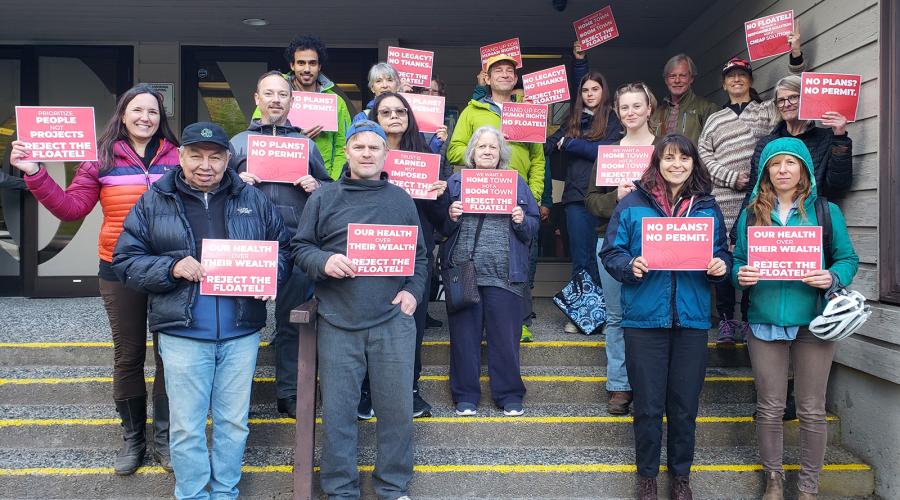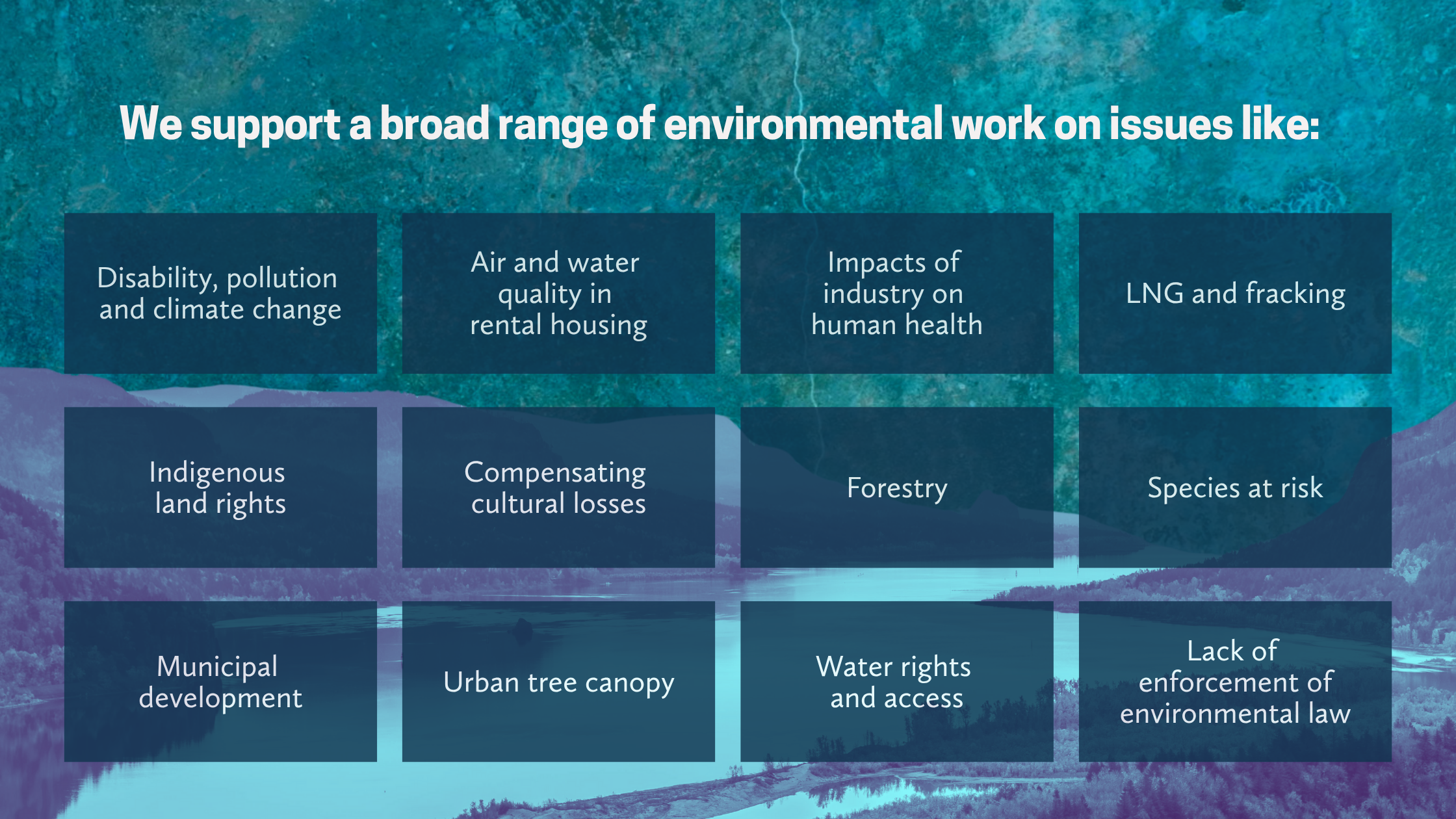
Here's some helpful information to answer common questions about the Environmental Dispute Resolution Fund (EDRF), one of West Coast Environmental Law’s Access to Justice programs.
Frequently asked questions about our EDRF
What is the application process? When will I hear back about my EDRF application?

- Reach out: Get in touch to learn if your environmental legal needs are eligible for funding. We can make a referral to a lawyer if you need one.
- Apply: Our team is available to help develop your application. There are five set deadlines for application review annually (listed at Apply to the EDRF).
- EDRF staff review your application: We may ask you for further information about your campaign or legal strategy.
- EDRF Management Committee: the Committee reviews your application and makes a decision to fund, decline, or defer your application.
- Funding decision: We will share the committee’s decision with you. This is usually three weeks after the application deadline.
We encourage you to get in touch with us before submitting an application to confirm that the work you are applying to fund meets the EDRF grant criteria (available for download at EDRF Grantee Tools) If you are facing urgent timelines, please let us know. It may be possible for the EDRF to review your application on an emergency basis.
Can I get help with my EDRF application?
Yes. As part of our commitment to environmental justice, decolonization, and equity, we are available to support you through the application process. Please contact our Access to Justice team at (604) 684-7378 ext. 229 or legalaid@wcel.org if you would like support with developing ideas, writing your application, or if you have any questions.
We also encourage you to contact us at if you have a need for any assistance or disability accommodations throughout the application process.
For support with your application, please contact the Access to Justice team at:
Email: legalaid@wcel.org
Phone: (604) 684-7378 ext. 229
Toll-free in BC: 1 (800) 330-9235 ext. 229
Our team is able to:
- Accept application forms and reports in alternative formats, including audio and video;
- Accept applications written by hand and photographed instead of PDF;
- Accept applications written in point form;
- Provide an audio-recorded version of the questions;
- Provide proposal assistance by discussing and helping to develop your case over the phone; and
- Incorporate additional support for translation services.
- If you experience difficulty with technology and/or written words, please contact us by phone so we can determine how best to support your application.
- The application is available in the dyslexia-friendly font Dyslexie Font on our website and upon request.
I don’t have a lawyer yet. Can I make an application for funding?
To receive funding through the EDRF, you must have an agreement to work with a lawyer and identify what legal work they will be doing on your case. Your lawyer will need to submit a letter of support with your application that confirms who is working on your file, what their hourly rate is, and their understanding of the rate at which the EDRF pays for legal fees.
If you do not yet have a lawyer, we are happy to connect you with some lawyers on our roster. Please reach out to our Access to Justice team at (604) 684-7378 ext. 229 or legalaid@wcel.org.
Can I apply for more funding in the future?
Once you have spent your EDRF grant, you may apply for further funding to continue your environmental legal work. The application form and process are the same for both initial and supplemental grant applications.
The maximum funding that can be granted towards a single environmental case is $50,000.
Can the details of my case be kept private for my privacy or safety?
Yes. We will ask for your consent before publicizing anything about your file.
Many EDRF applicants use public campaigns to further their environmental protection goals, however, if you would prefer not to have your file publicized, this will not affect your application’s chance of success.
Will I have to repay the grant if we lose our case?
You will not have to repay your grant if your case is not successful.
If you receive a costs award, monetary settlement, an award for damages or some other monetary compensation or repayment as a direct result of the work conducted under your grant, you will be required to repay the EDRF according to the ratio of your contributions to your EDRF case up to the amount of the compensation/repayment or the grant, whichever is less.
For example, if the client contribution and EDRF contribution were 50% each, then the EDRF and the Client would divide the award 50-50. If the Client contributed 30% and the EDRF contributed 70% towards the legal fees, then 30% of the award would go to the Client and 70% to the EDRF.
Funds received from return of cost awards are put into our general Fund and redistributed to make legal help available to new applicants.
What are my responsibilities as a grant recipient?
You are retaining your lawyer. It is your responsibility to communicate with your lawyer and ensure that your lawyer’s invoices are paid in full. EDRF staff need your written approval to pay funds out of your EDRF grant.
We ask that you keep in touch with us and share updates on your EDRF-funded legal work and campaign. Your updates enable us to ensure that your case is active and to offer assistance if possible.
What are some examples of cases you have funded through the EDRF?
- Safeguarding at-risk animal habitats (See 30 Years of the EDRF Report, p. 4)
- Holding polluters accountable (See blog post: Private prosecution launched by Bev Sellers into the Mount Polley disaster)
- Challenging marine dredging (See 30 Years of the EDRF Report, p. 5)
- Seeking damages against corporate polluters and raising questions about national and provincial oil spill response frameworks, and duties to Indigenous communities affected by spills (See blog post: Heiltsuk Nation – Seeking justice over the Nathan E. Stewart fuel spill)
For more featured cases, see EDRF Grantees.
How does West Coast view environmental issues?
West Coast takes an ecosystem-based approach to our legal work. We understand that functioning ecosystems are the essential foundation of healthy cultures and economies, and that human cultures and economies are part of a web of life that includes all parts of the ecosystem and all beings. We affirm the interconnectedness of environmental issues to human health, security, community well-being, cultural survival and/or social equity. We will give legal advice and consider EDRF applications where these issues are interconnected with environmental law issues.

Top photo: My Sea to Sky and Squamish community members successfully advocated to District of Squamish council to deny a permit to a floating work camp in Átl'ḵa7tsem (Howe Sound) / My Sea to Sky